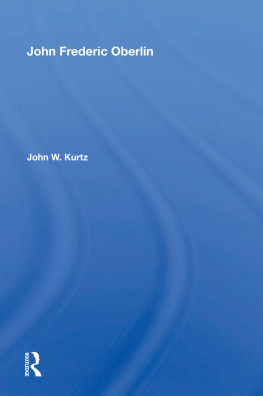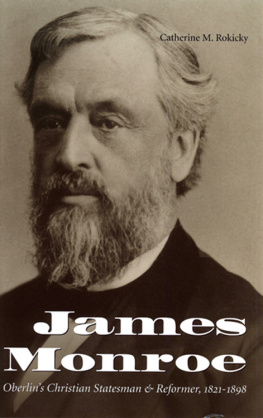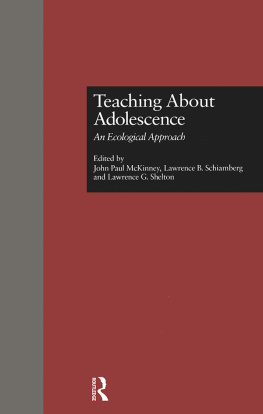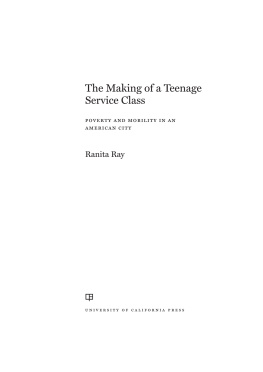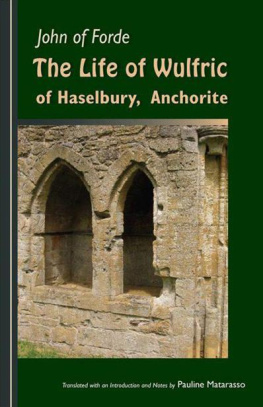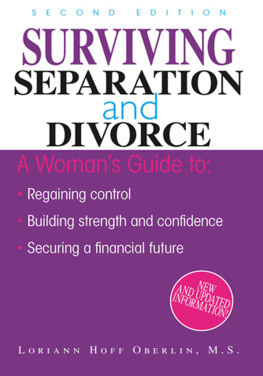JOHN FREDERIC OBERLIN
Ah friend, what is our life, if it is to be used only for our pleasure and prestige! ... I do not wish to live one moment more than I can be useful.... So long as I can learn,... capture, devise, apprehend, copy or acquire from others, anything by which the needs, the sorrows, and the miseries of so many oppressed people can be alleviated, I will let no ingratitude, no opposition, ... no expense ... restrain me.... Thus my life, in spite of countless adversities,... is a constant joy, and my death will be but a transition to continuing happy activity in the afterlife.
John Frederic Oberlin
John Frederic Oberlin
by John W. Kurtz
First published 1976 by Westview Press
Published 2018 by Routledge
52 Vanderbilt Avenue, New York, Y 10017
2 Park Square, Milton Park, Abingdon, Oxon OX14 4RN
Routledge is an imprint of the Taylor & Francis Group, an informa business
Copyright 1976 by Oberlin College.
All rights reserved. No part of this book may be reprinted or reproduced or utilised in any form or by any electronic, mechanical, or other means, now known or hereafter invented, including photocopying and recording, or in any information storage or retrieval system, without permission in writing from the publishers.
Notice:
Product or corporate names may be trademarks or registered trademarks, and are used only for identification and explanation without intent to infringe.
Library of Congress Cataloging in Publication Data
Kurtz, John W.
John Frederic Oberlin
Bibliography: p. 321
Includes index.
1. Oberlin, Johann Friedrich, 1740-1826.
BX4827.03K87 284'.1'0924 [B] 76-25211
ISBN 13: 978-0-367-02079-8 (hbk)
To the memory of William Henry Kurtz, country pastor, and Minnie Louise Kurtz, ne Grosshans, daughter of Alsace
Contents
- Part 1
From Strasbourg to Waldersbach: 1740-1767 - Part 2
Educational Reform, Economic Development, Spiritual Regeneration: 1767-1782 - Part 3
The Lonely Years: 1782-1788 - Part 4
Revolution and Liberation: 1789-1804 - Part 5
The Years of Fulfillment: 1804-1826
- Part 1
From Strasbourg to Waldersbach: 1740-1767 - Part 2
Educational Reform, Economic Development, Spiritual Regeneration: 1767-1782 - Part 3
The Lonely Years: 1782-1788 - Part 4
Revolution and Liberation: 1789-1804 - Part 5
The Years of Fulfillment: 1804-1826
Guide
The first book written about Oberlin was an English biography entitled Memoirs of John Frederic Oberlin. It was published anonymously in London in 1829, three years after Oberlin's death. Since then 101 books and more than 300 essays, articles, and tracts about Oberlin have been published in thirteen languages. In the face of such redundance, how can the publication now of yet another Oberlin book be justified?
To that question there are several answers. (1) Each of the existing biographies in English is little more than a rehash of that first publication of 1829, even to the extent that the historical errors made by its author are in all innocence repeated over and over again. (2) Of the two basic works in French, Ehrenfried Stoeber's of 1831 and Camille Leenhardt's of 1911, the first is now almost totally inaccessible, and the second is only slightly less hard to come by. (3) All the books since Leenhardt's seem to me to have failed to exploit adequately not only those documents now lost that were still available in 1911, but also other archival materials that are still to be found in Strasbourg and Waldersbach. (4) None of the previous biographers has adequately detailed the relationships between Oberlin's life and work and the social and intellectual currents of his time. (5) Practically all of Oberlin's biographers have emulated not only Stoeber's hortatory, propagandistic purpose, but also his rhapsodic, inspirational style, so that the traditional image of Oberlin created by them is that of a sculptured saint rather than of a living man of flesh and blood. After reading through , "Of Mysteries and Dark Enchantments," I have tried to contribute elements of impartiality and rational perspective to the argument.
I gratefully acknowledge my indebtedness for help and support to the following: to Oberlin College for two leaves of absence, for a research grant, and for permission to quote the passage from Robert S. Fletcher's A History of Oberlin College on page 281; to Mme Anne-Margrit Meyer for much help and countless favors; to Mme Claire Richardot, of the Walders-bach museum, to M. Georges Klein of the Museum of Alsace, and M. Josef Fuchs of the Municipal Library of Strasbourg for aid in research; to Professors Frederick B. Artz and Robert J. Soucy for reading the manuscript and for valuable criticisms and suggestions; to the John Frederic Oberlin Society for its support of this publication.
Picture Credits
Waldersbach painting courtesy of Mr. and Mrs. Harold S. Wood; Belmont painting courtesy of Mme Marie Scheppler; Oberlin-Banzt contract, botanical specimens, and Seven Worlds courtesy of Museum of Alsace; Doomsday Pillar and Man in Gallery courtesy of Photo service d'architecture d'oeuvre Notre-Dame de Strasbourg; map by Oberlin courtesy of Oberlin College; Fouday church and grave courtesy of Mr. J. Stanton McLaughlin.
The century of European history from 1750 to 1850 was a charismatic era. In philosophy it was the age of Hume and Voltaire and Diderot, of Kant and Fichte and Hegel, of Schelling and Schopenhauer. In politics and statecraft it was the era of Franklin and Washington, of Jefferson and Adams, of Frederick the Great and Catherine the Great, of Maria Theresa and Joseph II, of Napoleon and Alexander I. In science and technology it was the age of Watt and the Industrial Revolution, of Linnaeus and Malthus. In exploration it was the time of Humboldt and Cook and the Montgolfiers. In music it was the era of Haydn and Mozart, of Beethoven and Schubert. In education it was the age of Rousseau, of Campe and Basedow, of Pestalozzi and Froebel. In literature it was the time of Blake and Burns, of Wordsworth and Coleridge and Byron, of Lessing and Schiller; it was the age of Johnson and the age of Goethe. In religion it was the time of Wesley and Methodism, of the Moravian Brethren and the German Pietists, and of Jonathan Edwards and the Great Awakening. It was, withal, an age of transition: from rationalism and enlightenment to sentimentalism and romanticism. It was the age of revolution.
John Frederic Oberlin, whose life from his adolescence to his death covered three-quarters of that "century of the uncommon man," was not one of those who, in that optimistic age, designed the philosophical systems or promulgated the social concepts and principles that charted the course of Western civilization from the time of the aerostatic balloon to the age of interplanetary exploration. But as a well-educated burgher of his time, he read the treatises of the masters of science and philosophy and social theory; and in his everyday life as a country pastor and a social and educational reformer he found ways to convert the precepts of the thinkers into practical measures for the improvement of the life of a deprived people in the Ban de la Roche, the remote and backward community in and for which he lived and labored during the entire threescore years of his ministry. He made of his backwoods parish a living, working exemplar of the ideal community that has been envisioned in many a Utopian novel and tract. The story of his remote little community lies before us as a kind of laboratory demonstration of what social improvements could be accomplished by the imaginative utilization of the best wisdom of his time.



